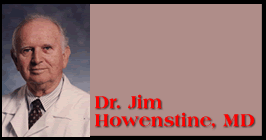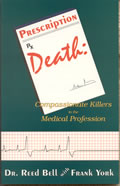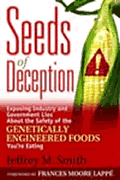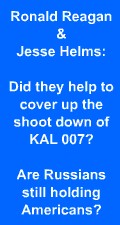Other
Howenstine Articles:
Use of CoQ10
to Treat Malignancies
Why You Should Avoid Taking Vaccines
WHAT CAUSES GALL BLADDER PAIN AND HOW TO AVOID SURGERY
By Dr. James
Howenstine, MD.
November 19, 2004
NewsWithViews.com
Conventional medical wisdom in the United States is convinced that gall bladder attacks are caused by the presence of stones in the gall bladder and that when fatty foods are eaten the gall bladder contracts producing the typical right upper abdominal pain. This concept is completely refuted by research performed by Dr. James C. Breneman in the 1960s and 70s. Dr. Breneman was chairman of the Food Allergy Committee of the American College of Allergists now called the American College of Allergy and Immunology.
What Dr. Breneman learned was that painful gall bladder attacks are actually caused by allergies to foods and medicines. In 1968 Dr. Breneman placed 69 patients havng typical painful gall bladder attacks on an elimination diet to determine what foods the patient was allergic to. Six of the 69 were still having attacks of gall bladder pain despite surgical removal of the gall bladder (post cholectectomy syndrome). Dr. Breneman discovered that all 69 patients were completely free of painful attacks when they avoided the offending foods and other allergies (medicines). Their pain recurred when they ate the allergic foods or took the problem medicines. The primary foods producing the painful attacks were eggs (92.8 percent), pork (63.8 percent), onions (52.2 percent), chicken and turkey (34.8 percent), milk (24.6 percent), coffee (21.7 percent), and oranges (18.8 percent). Corn, beans, nuts, apples, tomatoes, peas, cabbage, spices, peanuts, fish, and rye accounted for between 14. 5 percent and 1 percent of gall bladder attacks. Fourteen of the 69 patients were found to have gall bladder pain caused by allergy to pharmaceutical drugs.
Pin pointing these allergies is a sophisticated process so contact the American College for Advancement in Medicine (ACAM) phone 800-532-3688 or the American Academy of Environmental Medicine phone 1-316-684-5500 to obtain the name of a practitioner who can help you.
Unnecessary gall bladder removal is generally the recommended course of action for persons with recurring painful gall bladder attacks. The gall bladder stores large amounts of bile produced by the liver. Removal of the gall bladder can produce problems with the absorption of the fat soluble vitamins A, D, E and K as well as the essential fatty acids. Normal persons respond to a fat containing meal with the secretion of the appropriate amount of the hormone cholecystokinin to cause the gall bladder to release the correct amount of bile into the small intestine which results in complete absorption of the fat. Persons lacking a gall bladder have slow steady release of bile which is not adequate to allow complete absorption of all the ingested fat if a fatty meal is eaten This leads to suboptimal delivery of bile to the intestines with impaired fat absorption. The liver continues to produce large amounts of bile but this bile is no longer stored in the gall bladder for proper delivery to the intestine.
Most surgeons and primary care physicians do not instruct the patient who has had a cholecystectomy in the therapy needed after gall bladder removal. Provision of bile salts (tablets or capsules of bile) taking one to three after a meal depending on the quantity of fat eaten will correct the impaired reabsorption of fat. This generally permits absorption of enough essential fatty acids and fat soluble vitamins so there are no nutritional problems. Two good formulations are Cholacol from Standard Process Laboratories and Bile Salt Factors from Jarrow Laboratories. These bile salts can be found in natural food stores and are sold by Tehama Clinic 1-425-264-0059.
There
is a strong possibility that nearly all cholectstectomies are
unnecessary. Avoiding this surgery by learning what allergies are
causing your pain can save about $30,000 and avoid the risk of
abdominal surgery. A study
published in the New England
Journal of Medicine had shown
that the risk of gall bladder surgery (cholecystectomy) for gall stones
that were causing no symptoms was greater than risk of the infrequent
operation to remove stones that had escaped from the gall bladder and
impacted in the tube draining the liver (common bile duct). The article
concluded that gall stones that were not causing symptoms should be
left alone.
© 2004 Dr. James Howenstine - All Rights Reserved
Sign Up For Free E-Mail Alerts
E-Mails are used strictly for NWVs alerts, not for sale
Dr.
James A. Howenstine is a board certified specialist in internal
medicine who spent 34 years caring for office and hospital patients.
After 4 years of personal study he became convinced that natural
products are safer, more effective, and less expensive than
pharmaceutical drugs. This research led to the publication of his book
A Physicians Guide To Natural Health Products That Work. Information
about these products and his book can be obtained from amazon.com and
at www.naturalhealthteam.com
and phone 1-800-416-2806 U.S. Dr. Howenstine can be reached at jimhow@racsa.co.cr
and by mail at Dr. James Howenstine, C/O Remarsa USA SB 37, P.O. Box
25292, Miami, Fl. 33102-5292.
There is a strong possibility that nearly all cholectstectomies are unnecessary. Avoiding this surgery by learning what allergies are causing your pain can save about $30,000 and avoid the risk of abdominal surgery.








